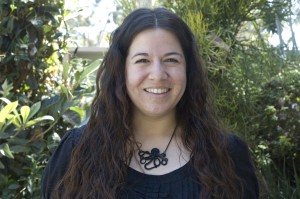When Brandilynn Villarreal (Class of ’09, M.A., clinical psychology) took a job as a grad assistant for the McNair Scholars Program at California State University, Dominguez Hills, she had thought the responsibility of helping underrepresented, first-generation college students prepare for advanced degrees was interesting. So much so, that as a doctoral candidate in social and personality psychology at the University of California, Irvine she decided to analyze how that same student population copes with graduate school.
“I had to come here and see that I was really interested in doing that,” says Villarreal, who had earned her bachelor’s degree in psychology at UCLA with a focus on social stigma and devalued identities.

In her work as a graduate student at CSU Dominguez Hills, Villarreal branched out into research on preventions of sexual risk taking behavior among underrepresented populations at CSU Dominguez Hills, working with her professors Dr. Karen Mason and Dr. Keisha Paxton, associate professors of psychology. Michelle Waiters, director of the McNair Program, says that Villarreal’s reputation as “a research star” was instrumental in supporting McNair Scholars in their research as undergraduates.
“[The students] really looked up to her in that area because that’s what they were aspiring to,” says Waiters. “Technically, she’s only a few years ahead of them but she was where they needed to be [as researchers], and she could get them there.”
Villarreal’s responsibilities in the McNair Scholar’s program, first as a grad assistant and then as program coordinator, included everything from extensive editing of the students’ writing, assistance with graduate school applications, and providing a lot of moral support. A student herself, Villarreal found that she enjoyed being a coach and role model.
“I always knew I liked teaching, but the concept of being a mentor was something new to me,” she says.
Villarreal says that along with the technical end of helping students with research papers and presentations the most important thing is “to be constantly in contact with the students.”
“If you’re not inquiring about them and caring about them, I feel it doesn’t work as well,” she says. “You’re preparing them for the next stage [of their education]. That’s where my training in clinical psychology comes in. I’m a listener and nurturer so I try to be there for them, whether it’s about school or not.”
For Villarreal, the result of her efforts is that the students are “an inspiration for me.”
“There are so many genius students in McNair, they amaze me,” she says. “They all have their own unique story; a lot of them have had many obstacles. They have shown me for my own research their challenges and success stories.”
For more information about the McNair Scholars Program, click here.